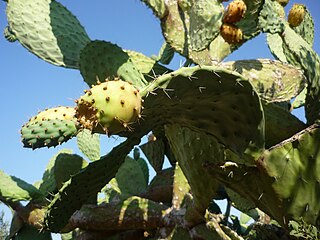
A sabra or tzabar is a modern Hebrew term that defines any Jew born in Israel. The term came into widespread use in the 1930s to refer to a Jew who had been born in Israel, including the British Mandate of Palestine and Ottoman Syria; cf. New Yishuv and Old Yishuv, though it may have appeared earlier. Since the establishment of the State of Israel in 1948, Israelis have used the word to refer to a Jew born anywhere in the Land of Israel.

Shaul Tchernichovsky or Saul Gutmanovich Tchernichovsky was a Russian-born Hebrew poet. He is considered one of the great Hebrew poets, identified with nature poetry, and as a poet greatly influenced by the culture of ancient Greece.

Avraham Shlonsky was an Israeli poet and editor born in the Russian Empire.

The Israeli population is linguistically and culturally diverse. Hebrew is the country's official language, and almost the entire population speaks it either as a first language or proficiently as a second language. Its standard form, known as Modern Hebrew, is the main medium of life in Israel. Arabic is used mainly by Israel's Arab minority which comprises about one-fifth of the population. Arabic has a special status under Israeli law.

The revival of the Hebrew language took place in Europe and the Palestine region toward the end of the 19th century and into the 20th century, through which the language's usage changed from purely the sacred language of Judaism to a spoken and written language used for daily life among the Jews in Palestine, and later Israel. Eliezer Ben-Yehuda is often regarded as the "reviver of the Hebrew language" having been the first to raise the concept of reviving Hebrew and initiating a project known as the Ben-Yehuda Dictionary. The revitalization of Hebrew was then ultimately brought about by its usage in Jewish settlement in Ottoman Palestine that arrived in the waves of migration known as the First Aliyah and the Second Aliyah. In Mandatory Palestine, Modern Hebrew became one of three official languages and after the Israeli Declaration of Independence in 1948, one of two official languages of Israel, along with Modern Arabic. In July 2018, a new law made Hebrew the sole official language of the State of Israel, while giving Arabic a "special status".

Mati Shemoelof, is an Israeli author, poet, editor, journalist and activist. His first short story collection, "Remnants of the Cursed Book", won the 2015 award for Best Book of the Year of "Yekum Tarbut" website. "Bagdad - Haifa - Berlin" - His first Bi-Lingual collection of poems was published in Germany by Aphorisma Verlag.
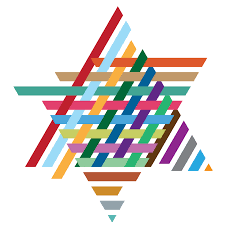
The Ministry of Aliyah and Integration is a ministry of the Israeli government responsible for providing assistance to immigrants.
In the years leading up to the dissolution of the Soviet Union in 1991 and for just over a decade thereafter, a particularly large number of Jews emigrated from the Soviet Union and the post-Soviet countries. The majority of these emigrants made aliyah, while a sizable amount immigrated to various Western countries. This wave of Jewish migration followed the 1970s Soviet aliyah, which began after the Soviet government lifted the ban on the country's refuseniks, most of whom were Jews who had been denied permission to leave the country.
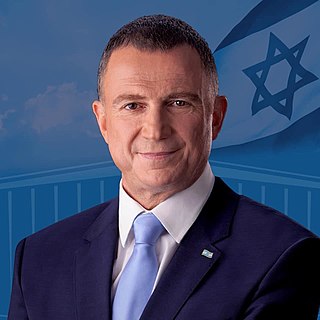
Yuli-Yoel Edelstein is an Israeli politician who served as Minister of Health from 2020 to 2021. One of the most prominent refuseniks in the Soviet Union, he was the 16th Speaker of the Knesset from 2013 until his resignation on 25 March 2020.

In Israel, prisoners of Zion were Jews who were imprisoned or deported for Zionist activity in countries where such activity was prohibited. The former Speaker of the Knesset, Yuli Edelstein, and the former chairman of the executive of the Jewish Agency, Nathan Sharansky, were both prisoners of Zion in the Soviet Union. In 1992 an Israeli law made the status of the prisoner of Zion official, however the status was in use long before.

Maxim D. Shrayer is a bilingual Russian-American author, translator, and literary scholar, and a professor of Russian, English, and Jewish Studies at Boston College.

The Russian language is spoken natively by a considerable proportion of the population of Israel, mostly by immigrants who came from the former Soviet Union from 1989 onwards. It is a major foreign language in the country, and is used in many aspects of life. Russian is the third most common native language in Israel after Modern Hebrew and Arabic. Government institutions and businesses often also provide information and services in Russian, and has effectively become semi-official in some areas with high concentration of Russian-speaking immigrants. The Russian-speaking population of Israel is the world's third-largest population of Russian native-speakers living outside the former Soviet Union territories after Germany and the United States, and the highest as a proportion of the population. As of 2013, 1,231,003 residents of the Post-Soviet states have immigrated to Israel since the fall of the Soviet Union. As of 2017, there are up to 1.5 million Russian-speaking Israelis out of total population of 8,700,000 (17.25%).

Amir Akiva Segal is a poet, literary critic, and an Israeli Sociologist.

Elisheva Bikhovski ; 20 September 1888 – 27 March 1949) was a Russian poet, writer, literary critic and translator, often known simply by her adopted Biblical Hebrew name "Elishéva". Her Russian Orthodox father, Ivan Zhirkov, was a village teacher who later became a bookseller and textbook publisher; her mother was descended from Irish Catholics who had settled in Russia after the Napoleonic Wars (1803–1815). Elisheva wrote most of her works in Hebrew, and also translated English and Hebrew poetry into Russian.
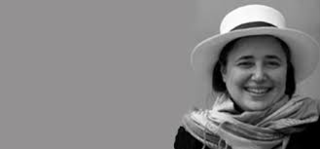
Haviva Pedaya is an Israeli poet, author, cultural researcher, and professor of Jewish history at Ben-Gurion University, where she is head of the Elyachar Center for Studies in Sephardi Heritage.

Sivan Beskin is an Israeli poet, translator, and literary editor.
Gali-Dana Singer is a Russian and Hebrew poet, artist, photographer, and translator who was born in Saint-Petersburg, Russia. She studied at the Leningrad State Institute of Theatre, Music and Cinematography in her hometown for three years, before deciding to leave without obtaining a degree. She immigrated to Israel from her native Leningrad in 1988, passing through and living in Riga with her husband Nekod Singer for three years before eventually settling down in Jerusalem where they currently reside. In the Israeli capital, her literary career and engagement in Russian and Hebrew culture and literature flourished.

Zoya Cherkassky-Nnadi is an Israeli artist, born in Kyiv in 1976, who migrated to Israel in 1991. Her works focus on her personal experiences, including childhood in the Soviet Union and migration to Israel. Cherkassky-Nnadi also helped found the New Barbizon Group with four other painters, all born in the former USSR.
Rita Kogan is a Hebrew author, poet, essayist and translator based in Tel Aviv. Born in Leningrad, she immigrated to Israel as a part of the 1990s post-Soviet aliyah, when she was 14 years old. After being trained as an engineer, Kogan eventually turned to poetry.
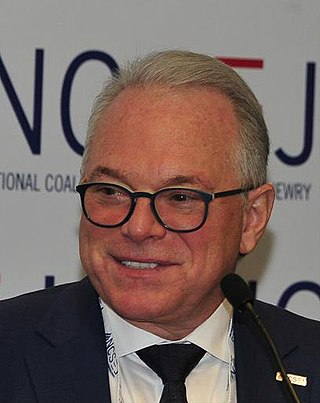
Alexander Smukler is a Soviet-born American businessman, who is the chairman of the board of Agroterminal LTD and the chairman of the board of Century 21: Russia, Kazakhstan, and Ukraine. He is a former managing partner of Ariel Investment Group, which develops commercial enterprises and civil engineering projects in Russia.

















